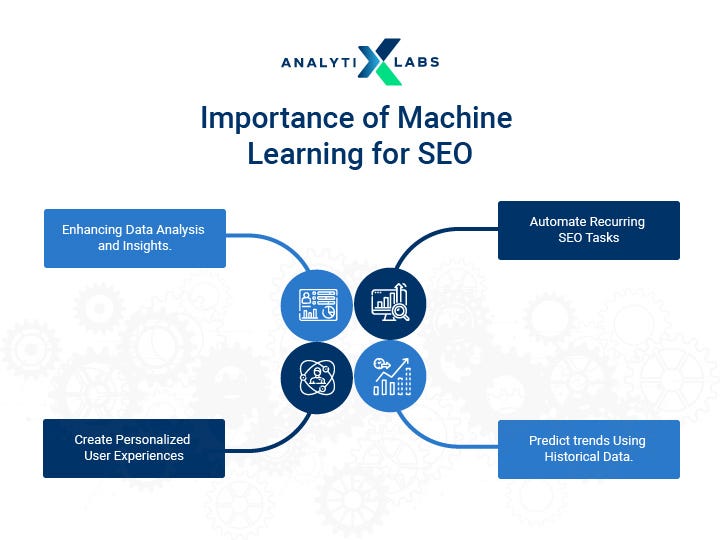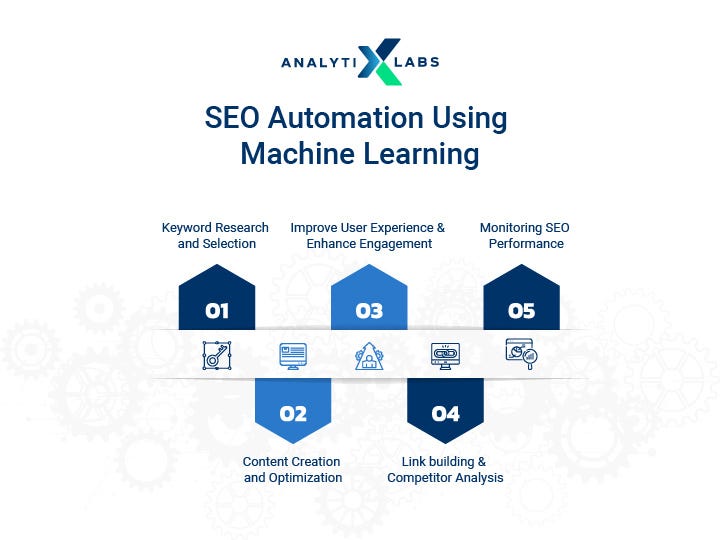What if you could free your marketing team from tedious tasks and utilize their creativity on strategic initiatives instead? A striking 66% of marketing leaders already see automation and machine learning as the gateway to this transformation.
Machine Learning is not just some trend; it’s a game changer, especially for marketing! Understanding and working with ML has become more important for businesses to stay on top of the game.
So, don’t worry, with us, you will learn all there is to implement this tool in your marketing strategies and make the best use of it. So, let the learning begin!
Exploring Machine Learning in Marketing
Machine Learning has made significant inroads into various marketing contexts, providing valuable tools and techniques that can also be leveraged for SEO. ML for SEO will enhance customer segmentation, trend analysis, and personalized advertising. It’s no surprise that around 75% of companies using machine learning and AI have improved customer satisfaction by over 10%.
By analyzing previous customer data, Machine Learning algorithms can segment audiences according to their behavior, preferences, and demographics, enabling businesses to tailor content strategies for specific groups.
ML can also efficiently work with large datasets, allowing it to identify emerging trends and shifts in consumer behavior. This helps businesses adapt their keyword strategies to stay ahead of changing search patterns, making ML a vital ally.
AnalytixLabs can be your starting point here. Whether you are a new graduate or a working professional, we have Machine Learning Certification Course with syllabi relevant to you. Explore our signature data science courses and join us for experiential learning that will transform your career. We have elaborate courses on Generative AI and Full-stack Applied AI. Choose a learning module that fits your needs—classroom, online, or blended eLearning. Check out our upcoming batches or book a free demo with us. Also, check out our exclusive enrollment offers
Importance of Machine Learning for SEO
Machine Learning has emerged as a boon in the world of SEO. It’s giving the way to be more smart work-oriented while optimizing the content. With the help of Machine Learning in SEO, you can –

- Analyze huge datasets in less time, enhancing data analysis and insights. For instance, analyzing user feedback through sentiment analysis can guide content optimization strategies, helping businesses align their messaging with what their audience expects.
- ML is known for understanding patterns, so it helps automate recurring SEO tasks like keyword research, content optimization, and monitoring SEO performance, giving an extra window to focus on high-level thinking topics.
- Machine learning enables businesses to create personalized user experiences through tailored content recommendations and to predict trends using historical data. This helps companies stay ahead of changes in search algorithms and adjust their SEO strategies.
How to Use Machine Learning for SEO: Tasks Automation Using ML
Utilizing the best SEO practices is crucial for every business to succeed. However, these tasks can sometimes be mind-numbing because they are repetitive and involve large datasets. Hence, we will now see how machine learning in SEO is helping companies automate these tasks and devote quality time to other important agendas.

-
Keyword Research and Selection
SEO keywords have a pivotal role in ensuring content ranks at the top. Selecting the right keywords will significantly impact your content’s success but often involves extensive manual searching and in-depth research. Now, imagine leveraging AI to avoid sifting through endless spreadsheets just to analyze keywords. That’s where machine learning comes in!
Machine learning can revolutionize your SEO strategy by identifying relevant keywords with high search volume and low competition that are aligned with your target audience. It helps spot emerging trends, stay ahead of the curve, and understand user intent to mold your content into what users expect.
It also discovers long-tail keywords for targeted traffic and significant conversion potential. Additionally, it offers a competitive edge by analyzing competitors’ keyword strategies, allowing you to refine your approach and seize new opportunities.
-
Content Creation and Optimization
After the keywords, machine learning will now help you with the next step of framing and optimizing the content.
- ML algorithms analyze the high-ranking existing topics and then suggest content topics related to the current hype.
- Machine learning models like OpenAI’s GPT-3 and Bard can produce high-quality, contextually relevant text, helping in crafting quick blog posts, articles, and product descriptions.
- NLP can help integrate chatbots that interact with users, readily answer their queries, or recommend related content.
- Utilizing machine translation models for content localization adapts content to various languages and cultural nuances, enabling a broader global reach.
-
Improve User Experience & Enhance Engagement
Good user experience is integral to SEO’s success. Websites with captivating user experiences consistently rank on the first page of any search engine. ML can analyze user interaction data like Click-Through Rate (CTR), Conversion rate, and Bounce rate.
With the help of this data, you can optimize your website layouts, improve load times, and enhance overall user experience. By understanding how users navigate a site, businesses can make informed decisions that lead to higher engagement and lower bounce rates.
-
Link building & Competitor Analysis
Backlinks are endorsements of your website. Links from trustworthy sources help you build credibility with both users and search engines. However, finding these authoritative sources is like finding a needle in a haystack.
Machine learning can identify potential backlink opportunities by analyzing competitors’ link profiles; hence, you can target similar pages. Additionally, using algorithms of ML for SEO will help scan the digital space and find you some websites with high domain authority and similar content, boosting your SEO effort.
-
Monitoring SEO Performance
Lastly, after crafting, optimizing, and putting the content live, it’s now time to monitor your website’s SEO performance constantly. ML tools can automate this process, providing real-time analysis and reports on ranking changes, traffic, and user behavior. This allows businesses to make data-driven adjustments quickly and effectively.
Real-World Applications of Machine Learning in SEO — Case Studies
There’s no debate that Machine Learning is now a powerful asset in the world of Search Engine Optimization. This has led to a significant shift in how businesses approach digital strategies, offering more precision and relevance in customer engagement.
Through the use of advanced algorithms and machine learning models, companies have developed systems that adapt to user preferences, improve over time, and ultimately boost customer satisfaction. Here, we explore two notable case studies: Netflix’s recommendation system and Amazon’s AI-powered shopping assistant, Rufus.
- Netflix Recommendation System — Netflix customizes recommendations for each user using AI. Even if the same account is accessed in different locations, the suggestions will vary based on viewing habits. The AI continuously learns and improves as users watch more content, refining the recommendations. Netflix’s recommendation engine, costing nearly $1 million annually, is designed solely to boost customer satisfaction.
- Amazon Rufus — Amazon Rufus is a generative AI-powered shopping assistant that helps customers make informed purchasing decisions. Using relevant information from Amazon and the web, Rufus offers detailed answers and insights. NLP helps it interpret human language, understand the intent behind queries, and generate relevant responses.
Machine Learning and SEO — Key Challenges
Automating SEO tasks is possible using Machine Learning algorithms, but only to a certain extent. The task will still require human intervention, no matter how perfect a model is. Yes, SEO machine learning can help do the job quickly, but it can’t fully replace manual oversight.
For example, you can use machine learning in SEO to assist you in researching, tracking, and automating tasks, but to truly optimize the website, an expert is needed to understand the thought processes and emotions of audiences to align the content and connect with them.
Understanding and implementing the outputs of these SEO machine-learning tools requires a certain level of expertise and training, which may require an additional investment. Also, training ML models typically demands large datasets and extensive computational power, which may challenge smaller businesses, restricting their ability to utilize ML fully.
Conclusion
Indeed, the alliance between machine learning and SEO is no less than a revolution in the marketing field, but it comes with its own pros and cons. A successful marketing strategy would balance utilizing this automation tool efficiently and being smart and creative enough to give in the human touch at times necessary. For businesses to flourish, they need to mindfully segregate the time and effort between the tasks a software can do and those that benefit from manual oversight.








